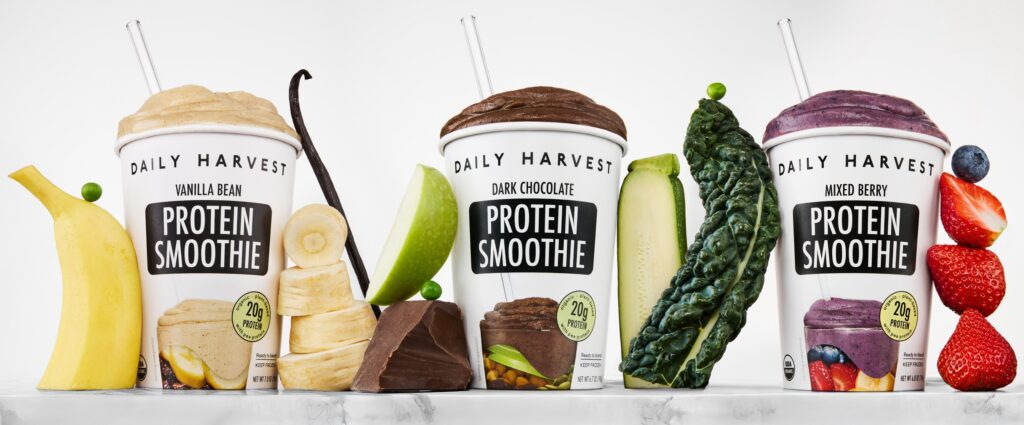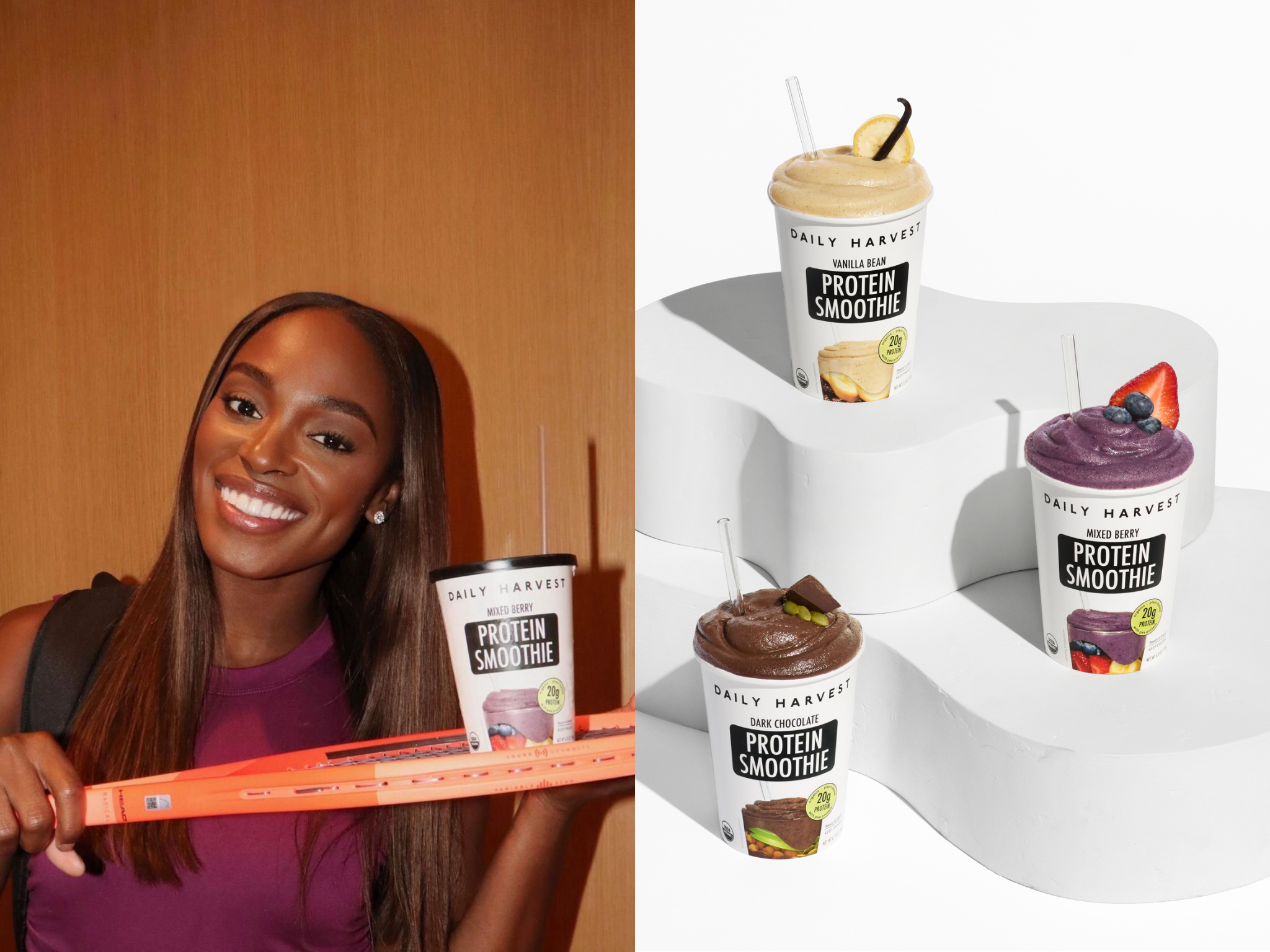High-Protein, High-Fibre: Tennis Star Sloane Stephens Hypes Up Daily Harvest’s GLP-1 Friendly Vegan Smoothies
4 Mins Read
Vegan meal startup Daily Harvest has launched a line of smoothies that pack 20g of plant protein per serving – and it’s tapped Sloane Stephens to help spread the message.
Already the owner of a vegan body care brand and following a plant-forward diet, US tennis star Sloane Stephens has partnered with ready meal maker Daily Harvest to promote its new high-protein smoothie range.
The New York-based vegan startup has rolled out ready-to-blend smoothies that pack 20g of protein from chickpeas and peas per 190g serving, and up to 10g of fibre. It plays onto the two most sought-after macronutrients in American diets at the moment, while also aiming to deliver on the demand for clean-label food products.
Available in dark chocolate, vanilla bean, and mixed berry flavours, the smoothies are available for $8.99 on Daily Harvest’s website, and can soon be found at Kroger and its subsidiaries, including Fry’s, Fred Meyer, Dillon’s, King Soopers, QFC, Ralphs and Smith’s.
Sloane Stephens: ‘Daily Harvest supports my peak performance’

The “nutrient-dense” smoothies contain whole-food ingredients like fruits and vegetables, dates and seeds, alongside vanilla bean and cocoa powders (depending on the flavour). The dark chocolate smoothie is being positioned as reminiscent of brownie batter, with the vanilla bean versions akin to classic milkshakes, and mixed berry evoking frozen yoghurt nostalgia. They also contain high levels of micronutrients like calcium, iron, and potassium, and are free from nuts and added sugars.
Buyers only need to empty the frozen contents into a blender, mix it with a liquid (like almond or oat milk), and whizz away. The idea is to pour the resulting smoothie back into the cup, minimising the need for additional cutlery – but at the same time, it does mean you need to wash your blender. And the product will likely not appeal to people who don’t have access to one.
One person it did allure is Stephens. The US Open winner says Daily Harvest’s meals and smoothies have become a go-to for maintaining peak performance, “whether I’m training, spending time with my family or running my business”. That business is Doc & Glo, which sells cruelty-free body lotions, scrubs, mists and deodorants.
Daily Harvest and Doc & Glo are working together to highlight their “commitment to supporting active lifestyles and overall wellbeing”, according to the announcement.
“As a professional athlete, I know the importance of fueling my body with clean, nourishing foods that can keep up with my demanding schedule,” said Stephens. “What I love most is how they make healthy eating effortless – just what I need to stay energised during my busy days.”
According to Daily Harvest, the new smoothie range is a response to one of its “most frequent” customer requests. “We’ve always prioritised engaging our loyal and highly engaged member base to help co-create and innovate across our portfolio,” said CEO Ricky Silver.
“As consumers continue to seek high-protein options to fuel their busy lives, no one wants to compromise on the need for real, wholesome ingredients,” he added. “Our new high-protein smoothies deliver on taste, satiety and nutrient density; no tradeoffs necessary.”
Can Daily Harvest attract Ozempic users?

In October, a report by 84.51° – the market research division of Kroger, where the new smoothies will debut – high-protein is the prized nutritional attribute in food products for consumers at its stores. Other major priorities include functional benefits and clean ingredients, both verticals that Daily Harvest is hitting on.
A 3,000-person survey last year also found that the two nutrients Americans are most interested in consuming are protein (71%) and fibre (64%), figures that increased from the poll’s 2023 edition.
The high-fibre content in the Protein Smoothie range will speak to consumers at a time when GLP-1 medications like Ozempic and Mounjaro are all the rage. More than one in eight Americans have already tried these injectable weight-loss drugs, which work by replicating a hormone found in our body.
That hormone – incretin – can also be regulated by dietary fibre. In the US, only 5% of adults meet the daily requirement of fibre intake, with the average consumption half this amount. At the same time, as of March 2024, 21% of US weight-loss drug users had been spending more on protein in the previous six months.
Meanwhile, over six in 10 Americans say they’d rather make a dietary change than take an injectable weight-loss drug if they wanted to lose weight. This has prompted food manufacturers – including giants like Nestlé and Conagra – to revamp their offerings and marketing to cater to those that use GLP-1 drugs, or are interested in doing so.
Daily Harvest itself began offering a GLP-1 companion collection of meals, with dishes like broccoli and white bean soup, dragonfruit and lychee smoothie, and bean and cabbage bowl. It was in response to “relatively slow” sales, Silver had said.
But he has indicated that the company won’t be aggressively pushing sales of these kits. “We definitely see it as an opportunity (but) not something we need to drastically pivot our focus toward,” he told Reuters in May. “Our food is already foundationally good for people taking these drugs.”
As for the protein smoothies, he hinted that there’s more of where that came from: “This launch is just the beginning – we’re excited to continue developing new protein-forward recipes that make it easier than ever for our customers to feed themselves and their families healthfully.”



